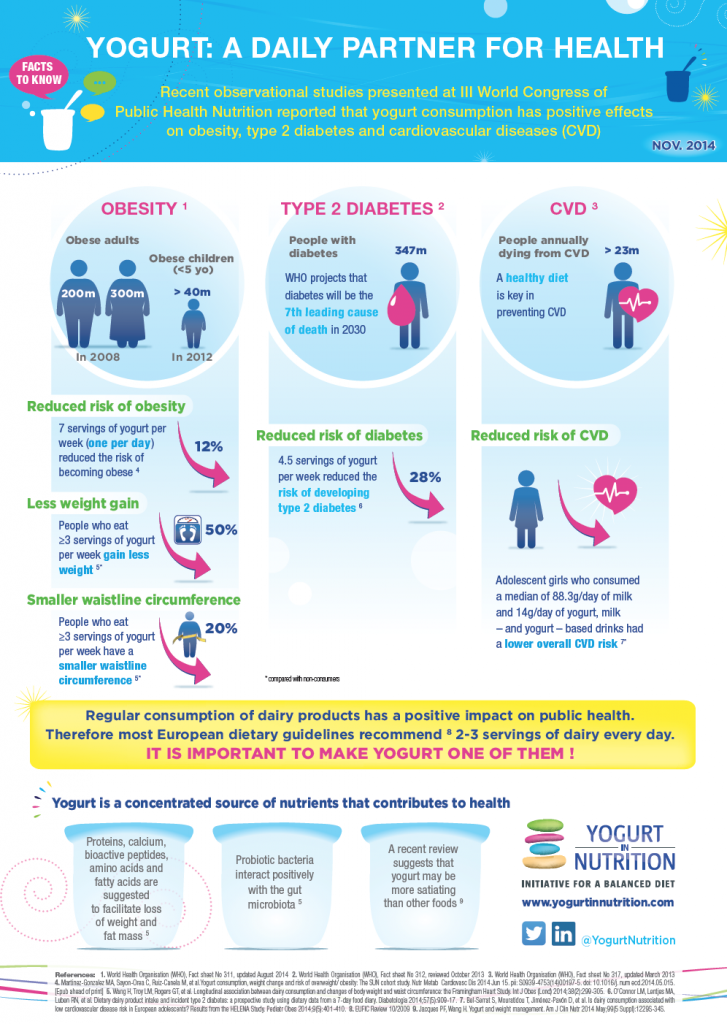“Our data suggest that yogurt and milk can play a key role in fighting obesity and CVD in adolescents,” says Professor Luis A. Moreno from the University of Zaragoza in Spain, who presented the findings at the III World Congress of Public Health Nutrition in Spain.
Obesity has become a burden of epidemic proportions affecting large numbers of the world’s population. According to the World Health Organization (WHO), the number of obese individuals worldwide has nearly doubled over the past 35 years. The young generation is affected to a growing extent: in Europe, between 5% and 25% of 11- and 13-year-olds, (depending on the country) are overweight, according to the WHO. This is particularly alarming considering that a variety of complications associated with obesity also increase the risk of developing CVD.
The consumption of milk and yogurt has the potential to play a key role in reversing this trend. This is suggested by the findings of the HELENA (Healthy Lifestyle in Europe by Nutrition in Adolescence)1 study presented by Prof. Moreno. This cross-sectional study ran over 2 years and included 511 girls and boys aged 12 to 17 from 10 European cities located in Greece, Germany, Belgium, France, Hungary, Italy, Sweden, Austria and Spain.
Although prior studies had already suggested a beneficial impact of diet on CVD risk, the HELENA researchers wanted to clarify the specific role of dairy products such as milk and yogurt in adolescents in reducing this risk. As part of the study, a number of CVD risk factors were assessed, including waist circumference, skin-fold thickness, blood pressure, insulin resistance, cholesterol levels and cardiorespiratory fitness.
Evidence for beneficial effects of milk and yogurt
The study showed that consumption of milk and yogurt (girls consumed a median of 88.3 g/day of milk and 14 g/day of yogurt, milk- and yogurt-based drinks in this study) was associated with a lower overall CVD risk in girls (standardised β-regression coefficient [β] –0.23; P=0.001).
In boys, however, milk and yogurt consumption (boys consumed a median of 141 g/day of milk and 11 g/day of yogurt, milk- and yogurt-based drinks) was only associated with a smaller waist circumference (β –0.176; P=0.02), less body fat (β –0.154; P=0.023), and higher cardiorespiratory fitness (β –0.173; P=0.015). This means that, for boys, only three of the CVD risk factors were reduced by the consumption of milk and yogurt, probably as a result of physiological differences between digestive processes in males and females.
Although the HELENA study, strictly speaking, only shows a correlation between milk and yogurt consumption and a decreased CVD risk, causal links are likely to exist. According to Prof. Moreno, several components of milk and yogurt – among them dietary calcium – inhibit lipogenesis and promote lipolysis.
Also abundant in dairy foods is the amino-acid, leucine, which probably plays a role in the repartitioning of dietary energy from adipose tissue to skeletal muscle, thus promoting fat loss. A similarly beneficial effect is attributed to conjugated linoleic acid, which is also present in dairy products, and which reduces adipose tissue mass.
“This effect could be explained by the induction of adipocyte apoptosis or the differentiation and reduction of triglyceride accumulation in adipocytes or both”, says Prof. Moreno. Additionally, dairy proteins are better than plant proteins in supporting muscle protein synthesis, and this enhanced anabolism is assumed to increase energy expenditure. And last but not least, when milk and milk products are removed from the diet they are often replaced by other energy-dense foods and by sweetened beverages, which both tend to cause weight gain.
“Scientists are working hard to understand how dairy products affect CV risk factors, “says Prof. Moreno. “Our data strongly confirm the assumption that yogurt and milk are one of the key partners in preventing CVD in adolescents and improving public health.”
Source:
1. Bel-Serrat S, Mouratidou T, Jiménez-Pavón D, et al. Is dairy consumption associated with low cardiovascular disease risk in European adolescents? Results from the HELENA Study. Pediatr Obes 2014;9(5):401-410.
About the Yogurt in Nutrition Initiative (YINI)
The Yogurt in Nutrition Initiative for a Balanced Diet is a multi-year global, collaborative project led by the Danone Institute International (DII) in collaboration with the American Society for Nutrition (ASN) and the International Osteoporosis Foundation (IOF) which aims to evaluate the current evidence base on the nutritional impact of yogurt. The mission of the project is to uncover scientific data related to yogurt, stimulate new research and identify gaps in our understanding of the health effects of this food category in order to share this information with professionals and the public. https://www.yogurtinnutrition.com; Twitter : @YogurtNutrition
Press contact: impressum health & science communication
Frank von Spee
Email: vonspee@impressum.de
Tel: +49 (0)40 – 31 78 64 10
Fax: +49 (0)40 – 31 78 64 64













